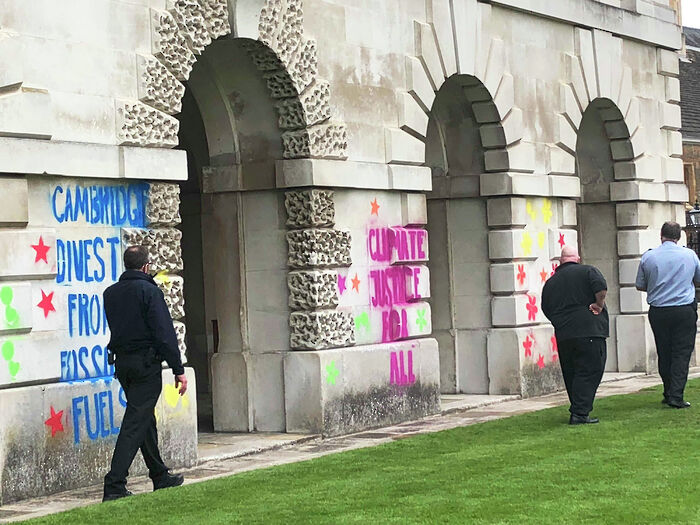Students occupy central administrative building ahead of divestment decision
25 students have occupied Greenwich House, which contains the University offices for finance and research operations

Students have occupied a key University administrative building housing several key administrative offices in their latest push for the University to divest fully from fossil fuels.
A group of 25 activists entered Greenwich House, which contains the finance offices that were previously barricaded by members of Zero Carbon just last month, at 10:30pm last night, marking the beginning of the second occupation of the building this year.
The occupiers have secured open access for the public to the building and have invited other students to join the occupation, as well as to attend teach-outs later in the week.
The group, members of which have come from pro-divestment campaign group Zero Carbon Society, has vowed to remain in the building until the University agrees to full divestment from fossil fuels. The occupation comes just two days before the University is set to make a long-awaited decision of whether to lead Cambridge to divest fully from fossil fuels.
A spokesperson for the University of Cambridge said: “We are aware of an ongoing incident at Greenwich House. Security are on site and handling the situation.”
On Monday, students will rally outside Senate House at 9:30am as Council members arrive for the final meeting before the University Council takes its decision on the University’s presently-held indirect investments in fossil fuels moving forward, based on a working group report prepared by the administration’s divestment working group.
The occupation rounds off a week of escalating action by Zero Carbon. On Monday, members sprayed chalk paint graffiti on the walls of the University’s central administration building, which the University claimed yesterday has been removed at “a significant cost”, and on Wednesday three first year undergraduates began a hunger strike.
Stephen Toope, Cambridge’s vice-chancellor, addressed a room of 80 students earlier this week, discussing the topic of divestment and the University’s ethical responsibility in its investments at the forefront of Cambridge’s central issues. The meeting, held on Tuesday, was the second of two open meetings organised in response to a five-day student occupation held in March.
At the open meeting, the vice-chancellor addressed present members of Zero Carbon, who questioned him on the urgency of climate justice and Cambridge’s role in fighting against it. Students pointed to institutions such as the London pensions fund, the University of Bristol, and the Church of Ireland, all of which have already divested. Commenting on the risks of divesting now, when institutions worldwide are hesitant to step up, Toope said they were asking: “Exactly the right question”, but that there was “not an easy answer.”
This occupation marks another flashpoint in a year which has seen an unprecedented peak in student activism. Before 2018, the last student occupation in Cambridge took place at the start of the decade, in response to cuts to spending on further education and an increased cap on tuition fees.
 News / Cambridge student numbers fall amid nationwide decline14 April 2025
News / Cambridge student numbers fall amid nationwide decline14 April 2025 News / Greenwich House occupiers miss deadline to respond to University legal action15 April 2025
News / Greenwich House occupiers miss deadline to respond to University legal action15 April 2025 Comment / The Cambridge workload prioritises quantity over quality 16 April 2025
Comment / The Cambridge workload prioritises quantity over quality 16 April 2025 Sport / Cambridge celebrate clean sweep at Boat Race 202514 April 2025
Sport / Cambridge celebrate clean sweep at Boat Race 202514 April 2025 Features / The TikTok college: using social media in access and outreach15 April 2025
Features / The TikTok college: using social media in access and outreach15 April 2025







